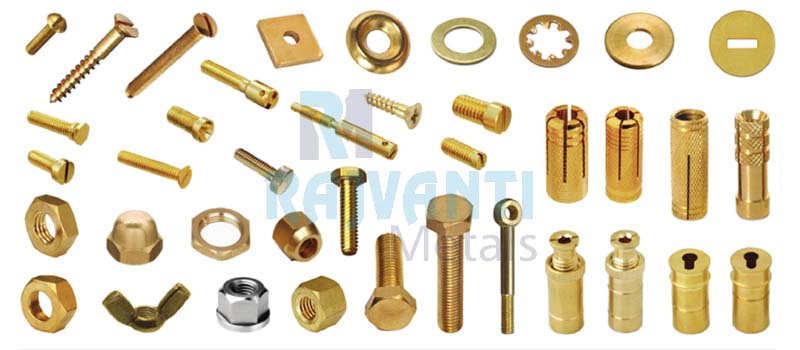Fasteners
Fasteners are a hardware device that mechanically joins or affixes two or more objects together. In general, fasteners are used to create non-permanent joints i.e joints that can be removed or dismantled without damaging the joining components. We offer high quality fastener products such as brass nuts, brass bolts, brass anchors, washer, screws and brass inserts. Fasteners come in different sizes and we use high quality brass enhance their precision that suit metallic or wooden surfaces to which they are supposed to mount on. Any kind of Fasteners can be developed and supplied exactly as per customer specifications, design and requirement.
Material
- Brass, Steel, Stainless Steel, Martensitic Stainless Steel, Austenitic Stainless Steel, Carbon Steel, Copper, Galvanized Steel
Application
- Brass Screws are used for both interior and exterior work.
- General Range of Brass Screws are used to hold objects together and to position objects.
- Precision Brass Screws for controlling motion rather than fastening.
- Standard Brass Screws are available for critical high-tensile-strength applications, low-grade screws may fail, resulting in damage or injury.
- Brass Nuts are almost always used in conjunction with a mating bolt or screw to fasten multiple parts together.
- General Range of Brass Nuts are used in applications where vibration or rotation may work a nut loose.
- Precision Brass Nuts are used in automotive, engineering, and industrial applications usually need to be tightened to a specific torque setting, using a torque wrench.
- Standard Brass Nuts prevent Self-Loosening.
- Brass Nuts are widely used for all type general fastening and installation application.
Benefits
- General Range of Brass Screws are made with any type of Head, Threads, slotting and more.
- Brass Screws are made with a concealed, small, cross, cylindrical, hemispherical and semi-hollow head.
- Standard Brass Screw heads keep the screw from being driven deeper than the length of the screw and to provide a bearing surface.
- Brass Screws are the most Versatile and useful types of fasteners, Available in multiple sizes and styles.
- Threaded Brass Screws either have a tapered shank or a non-tapered shank.
- Brass Nuts are available with threaded hole as per custom specified.
- A wide variety of brass nuts exists, from household hardware versions to specialized industry-specific designs that are engineered to meet various technical standards.
- Brass Nuts are graded with strength ratings compatible with their respective bolts.
- An ISO property class 10 brass nut will be able to support the bolt proof strength load of an ISO property class 10.9 bolt without stripping.
- General Range of Brass Nuts meet the needs of many different applications and come in a variety of different standard grades.
- Brass Nuts are available with different styles, lengths, finishes, and materials.
- Standard Brass Nuts are available with Anti-Corrosion properties.
Operation
- For most of Brass Screws, a coating, such as electroplating with zinc (galvanizing) or applying black oxide, is applied to prevent corrosion.
- The Brass Screw Threads are usually produced via thread rolling, however some are cut.
- Three Steps of manufacturing Brass Screws including Heading, Thread Rolling and Coating.
- Brass Screws are available with tapered shanks are designed to either be driven into a substrate directly or into a pilot hole in a substrate.
- Brass Screws with a non-tapered shank are designed to mate with a nut or to be driven into a tapped hole.
- The preload pulls the brass nut threads against the bolt threads and the Nut face against the bearing surface, with a constant force.
- The tightening procedure should be used if effective locking is to be achieved by Brass Nuts.
- Three Steps of manufacturing Brass Nuts including Heading, Thread Rolling and Coating.
- Brass Nuts are available with different types of finishing and coating include Chrome, Nickle, Brass, Copper, Zinc, Electrolytic Tin and more.
- Ensure that the full strength of the Brass Nut is developed rather than a premature failure from thread stripping.
